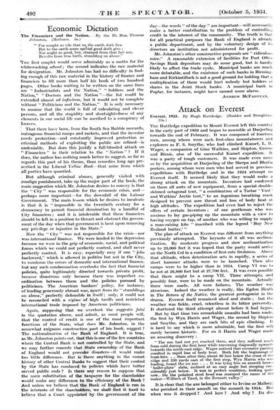Economic Dictation
The Financiers and the Nation. By the Rt. Hon. Thomas Johnston. (Methuen. 5s.)
"` For nought so vile that on the earth doth live But to the earth some speCial good doth give ; Nor aught so good, but, strained from that fair use, Revolts from true birth, stumbling on abuse."
Tim first couplet would serve admirably as a motto for the whitewashing school ; the second indicates the raw material for denigration. Mr. Johnston has had no difficulty in find- ing enough of this raw material in the history of finance and financiers to fill more than half his book of two hundred pages. Other books waiting to be written on the same lines
are " Industrialists and the Nation," " Soldiers and the Nation," " Doctors and the Nation "—the list could be extended almost ad infinituni, but it would not be complete without " Politicians and the Nation." It is only necessary to assume that the world is full of calculating and clever persons, and all the stupidity and shortsightedness of any elements in our social life can be ascribed to a conspiracy of knaves.
That there have been, from the South Sea Bubble onwards, outrageous financial ramps and rackets, and that the investor needs protection—and constantly improved protection as criminal methods of exploiting the public are refined—is .undeniable. But does this justify a full-blooded attack on " Financiers " in their relation to the " Nation " ? If it does, the author has nothing much better to suggest, so far as regards this part of his theme, than remedies long ago pre- scribed in the Liberal YellOw Book—that mine from which all parties have quarried.
. But although criminal abuses, generally visited with condign punishment, take up the major part of the book, the main suggestion which Mr. Johnston desires to convey is that the city " was responsible for the economic crisis, and— perhaps more important—for the downfall of the Labour Government. The main lesson which he desires to inculcate is that it is " impossible in the twentieth century for a democracy to permit fmancial domination by a handful of City financiers ; and it is intolerable that these financiers should be left in a position to thwart and obstruct the govern- ment of the day when that government is bent upon removing any privilege or injustice in the State."
Now the " City " was not responsible for the crisis—nor was international finance. We were landed in the depression because we were in the grip of economic, social, and political forces which we could not perfectly control, and shall never perfectly control. It is easy, especially easy if one " jobs backward," which is allowed in polities but not in the City, to condemn the errors of domestic and international finance,
but any such condemnation overlooks the fact that financial
policies, quite legitimately directed towards private profit, became disastrous only because there was imperfect co- ordination between them and the policies pursued by politicians. The American bankers' policy, for instance, of lending generously abroad was, apart from its " stumblings on abuse," perfectly defensible in itself ; only, it could not
be reconciled with a regime of high tariffs and restricted international trade imposed by American politicians. Again, supposing that we overlook the suggestio falsi
in the quotation above, and admit, as most people will, that the control of credit is one of the most important functions of the State, what does Mr. Johnston, in the somewhat exiguous constructive part of his book, suggest ? The nationalization of the Bank of England. It is true, as Mr. Johnston points out, that this is one of the few countries where the. Central Bank is not controlled by the State, and we may further concede that State ownership of the Bank of England would not provoke disasters—it would make too little difference. But is there anything in the recent history of other Central Banks to suggest that their control by the State has conduced to policies which have better served public ends ? Is there any reason to suppose that the mere substitution of the taxpayer for the shareholder would make any difference to the efficiency of the Bank ?
And unless we believe that the Bank of England is run in the interests of the shareholders, we shall find it hard to believe that a Court appointed by the government of the
day—the words " of the day " are important—will necessarily make a better contribution to the problem of controlling credit in the interest_of the community. The truth is that for all practical purposes the Bank of England is already a public. department, and by the voluntary design of its directors an institution not administered for profit.
Mr. Johnston's other constructive proposals are " ridiculous mice." A reasonable extension of facilities for Post Office Savings Bank depositors may do some good, but is hardly likely to affect the trade cycle. Municipal banks are much more debatable, and the existence of such banks in Birming- ham and Kirkintilloch is not a good ground for holding that a multiplication of them would hurt nobody but holders of shares in the Joint Stock banks. A municipal bank in Poplar, for instance, might have caused some alarm.
ANDIIEW MCFADYEAN.










































 Previous page
Previous page